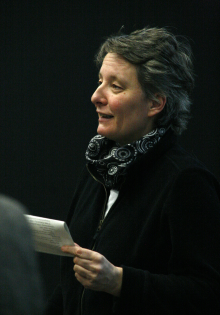A Paderborn-led research project is examining the opportunities and challenges of chipless RFID technology
RFID (radio-frequency identification) technology often remains invisible in our everyday lives, yet is virtually everywhere: chips can for example be found in ID cards, vehicles, clothing, the environment, animals, and sometimes even people. These chips store information such as production data, supply chains and prices, names, dates of birth, or biometrics. However, a new technology has emerged in recent years that enables the production of RFID tags without chips and their incorporation into almost any item at an affordable cost.
To investigate this technology, an interdisciplinary research collaboration has been established between the Media, Culture & Society, Science & Technology Studies (STS), and Electrical Engineering subject areas with the aim of establishing an overall picture of the opportunities, challenges and conflict scenarios relating to widely used chipless RFID applications. In order to achieve this, the researchers are systematically analysing the social, political and epistemological significance of the mass usage of chipless RFIDs. The two-year ‘UbiTag’ research project was launched in July and is receiving around 300,000 euros of funding from the Federal Ministry of Education and Research (BMBF). It is being headed by Prof. Dr. Jutta Weber of the Department of Media Studies at Paderborn University and her research assistant Jasmin Troeger, in conjunction with Prof. Dr. Daniel Erni of the Department of General and Theoretical Electrical Engineering (ATE) at the University of Duisburg-Essen.
An affordable alternative to a widespread technology
‘The radical innovation potential of chipless RFID technology has not yet been recognised, as it has generally been erroneously viewed as simply a marginal advancement of an established technology. However, it will play a major role in enhancing the quality of the world’s digital inventory’, Weber explains. Printable chipless RFID tags cost well under a cent each to produce, making them a significantly cheaper alternative to models using chips. ‘This means that they will become the key replacement technology for the currently widely used optical barcode, which – unlike an RFID tag – requires a direct line of sight and can only be read one at a time’, Erni notes.
The opportunities and risks of printable RFID tags
Our world’s increasing digitalisation and inventory has huge social and political consequences: it enables new forms of social regulation such as surveillance or behavioural prediction, but also new forms of knowledge via the classification and datafication of organisms and objects. Printable RFID tags significantly broaden the range of opportunities for assignment and categorisation.
The new identification code allows the physical (consumer) world to be comprehensively numbered, meaning that every material object can be individualised and made identifiable and traceable, and thus given a readable individual history. For example, a shampoo bottle in the bin becomes the bottle of shampoo purchased by John Smith on 12/03/2021 at 3:43 p.m. for 3.95 euros from Sample Pharmacy, Any Street 1, Anytown.
Discussion of the social impact of RFID touches on two major focal points: on the one hand, the technology offers potential for logistics and business processes, whilst on the other it presents risks for privacy and data protection. ‘The prospect of significantly cheaper and widely distributed RFID tags suggests a new quality of surveillance and behavioural prediction. In this project, we are seeking to expand this discourse with a comprehensive stocktake of the potential developments and consequences of printable RFIDs and lay the foundations for broad social debate, subsequently enabling participatory processes’, Weber explains regarding the project’s goals.
Making research findings easy to understand
To lay the foundations for broad social debate, the research findings will be published on the project’s own website, on social media channels and in scientific publications. The researchers involved and invited scientists will explain key aspects of widely used printable RFIDs in a short, easy-to-understand way via mini interview clips, which will most likely appear on the project’s website in the summer of 2023. In addition, the project team will be incorporating especially commissioned science fiction stories into its research. These stories will present and explain the abstract topic to all interested readers, both in an English-language anthology and via podcasts.


